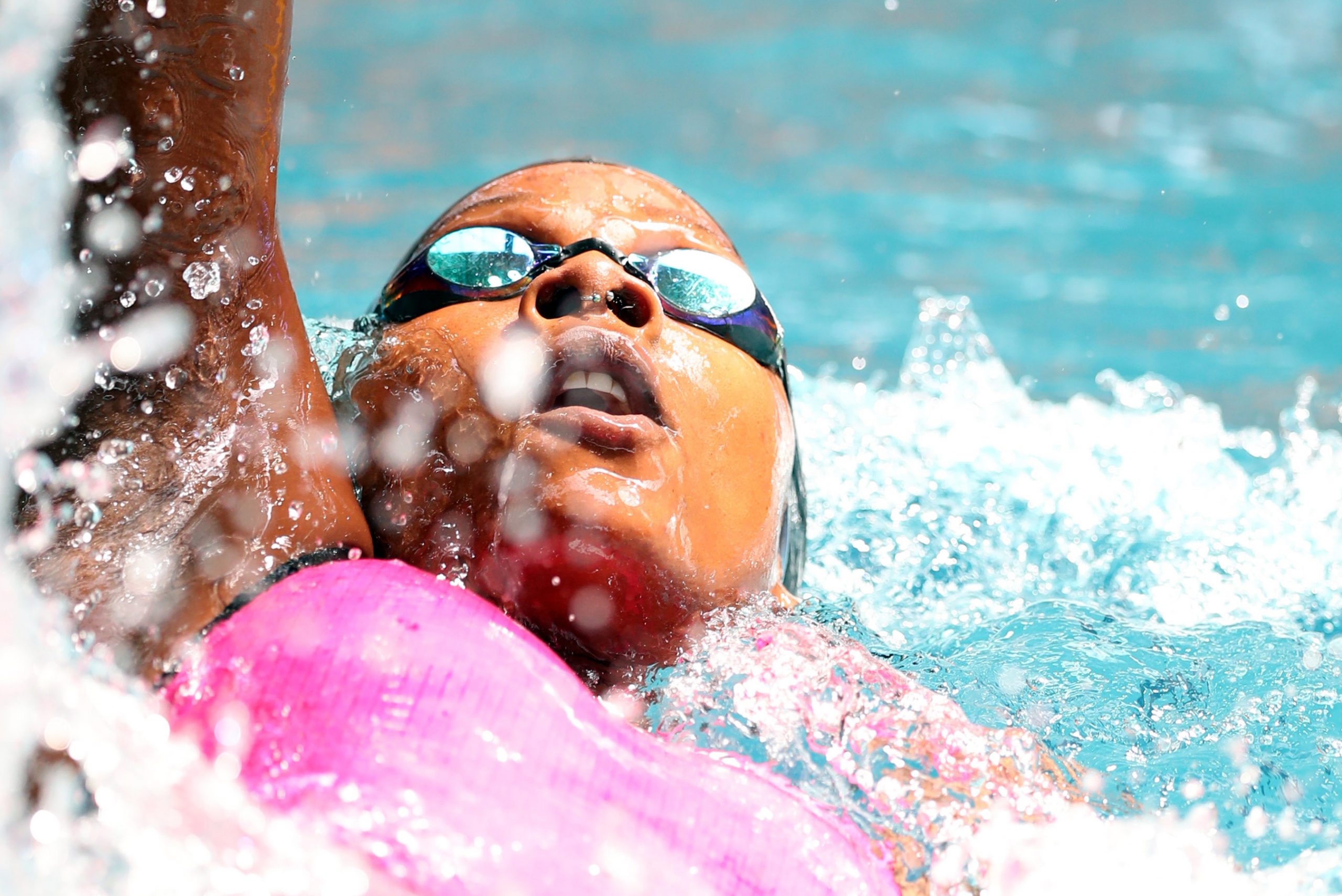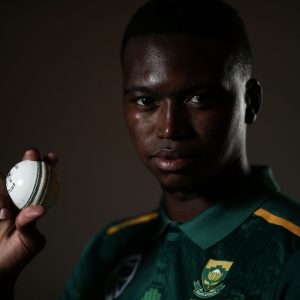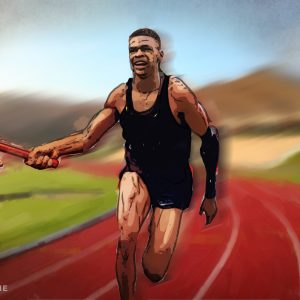Naomi Ruele clears the racist waters for black swimmers
The Botswana-born, US-based athlete has faced stigma and racism as a black swimmer. She hopes to change that so future generations have an easier time in the sport.
Author:
20 July 2020

Asked a year ago, Naomi Ruele would probably have told you that qualifying for the Tokyo Olympic Games was her chief focus. But after the chaotic events of the past few months, particularly in the United States where she’s based, her priorities have shifted slightly.
Ruele studied in the US and qualified to represent Botswana in swimming at the 2016 Olympic Games in Rio. Having graduated from university last year, she’s now working in New York City – not only where the Covid-19 pandemic has hit hard but also where thousands have protested in recent weeks following the police killing of George Floyd, giving renewed impetus to the call that Black Lives Matter.
That’s what has occupied Ruele’s mind. She’s certainly been subjected to her share of racial discrimination. Despite reaching the highest echelons of her sport, being one of the very few black swimmers on a pool deck inexplicably seems to bring that out in people.
“There is a huge stigma that black people can’t swim,” she explained. “With the current racial climate, I think it’s being brought to light. But to give some examples of my personal experiences, I have been told I shouldn’t know how to swim because I’m black. Why don’t I try a sport more suited for me? But also, there have been so many times where people have gone so far as to bring a biological standpoint. I have had someone tell me they are shocked I know how to swim because ‘black people are usually big-boned, thus heavier in the water’.”
Undeterred, Ruele relished exposing her doubters’ ignorance in the pool. As Florida International University (FIU) head coach Randy Horner pointed out: “Naomi was one of the top athletes in our programme history at FIU. She qualified and participated in the NCAA [National Collegiate Athletic Association] Championships each year and dominated Conference USA to help our team win five team championships in her time at FIU.”
While representing her country at the Olympics was always a target, Ruele has seen her role in the pool as more than that: to inspire other Batswana swimmers to continue breaking down that stereotype.
Related article:
“I think after so many different life-changing occurrences in 2020, my purpose in the swimming world has been brought to light,” she said. “I started swimming so that I could do great things and qualify for the Rio Olympics. Once I realised the impact that could have to create positive change, my goals shifted to continue to create a positive impact for young black girls and boys from Botswana and show them it is in fact possible.
“That is still my ultimate goal and again, with the racial climate, I’m starting to wonder if my knowledge, experience and even ideas would be better suited in working to decrease that stigma. Basically, I’m saying I’m currently reviewing my priorities and what my place is. The Olympics is still in my head though.”
From Gaborone to the US via Pretoria
Ruele’s swimming journey began in the pool of a hotel in Gaborone, where her mother was the manager.
“While she was working, I would swim so that we could have some time to spend together because she would work late nights. I think I had always had a sporty personality and ability. I played multiple sports for school teams, so I would say I was pretty quick at learning drills and advancing in the sport. It was definitely with hard work though.”
Ruele rose quickly through the ranks at the DMSS swimming club in Gaborone and then nationally. The next step was one outside of Botswana’s borders, before she made contact with coaches in the US and eventually joined the programme at FIU in Miami.

“I was taken to Tuks [the University of Pretoria] for a high-performance, three-week training camp and through doing those, sporadically ended up going there for months at a time until eventually I was connected to some USA coaches who were interested in me, provided my grades would be able to get me into the university. I then ended up competing in the US after a massive shoulder surgery that, it turned out, was hindering a lot of my growth as a swimmer.
“Going to an American college impacted me in learning different perspectives. However, I attribute a lot of my growth and development in general to my sprint coach, Ignacio Gayo, in Miami. He is a kind, caring and very focused person. He took me under his wing through understanding what it took for me, personally, to grow as a swimmer. Training and success is not a one-size-fits-all.”
Ruele excelled at college level, setting numerous records and being instrumental in her team’s conference successes.
She medalled as a guest swimmer at the South African National Championships and competed at the 2014 Youth Olympic Games in Nanjing, China. While still a teenager, she then qualified to represent Botswana in the 50m freestyle event in Rio. A 47th-place finish overall was not the result she would have wished for at her first Olympics, but it led to plenty of self-reflection.
Related article:
“My Rio experience was truly one for the books. I had been to multiple competitions, but this was so new to me that I ended up feeling truly overwhelmed,” explained the communications graduate, echoing the sentiments of so many first-time Olympians.
“It was very inspiring to be among some of the best athletes in the world, but looking back I wish I had been better prepared emotionally.
“Leaving Rio and doing self-reflection, it truly clicked what I had been lacking was confidence. I had been confident in myself as a person but not as a swimmer for various reasons, and that really cost me when I had done all the training and put in every other aspect. Years later, I am much more confident, through lots of work.”
Impact of Covid-19
That hard work has been put on hold for the past few months, in the pool anyway, as Covid-19 has put a halt to any training activities in the water.
“Because of Covid-19 hitting New York City, we have not been able to train full-time. I am, however, keeping my endurance up through hefty dryland activities,” said Ruele, adding that the 50m freestyle and 100m backstroke would still be her chosen events for the postponed Tokyo Games in 2021.
About the upheaval of the Games’ postponement, she said: “I think the most difficult thing is believing that this is the time that it will happen, and the work you put in will come to fruition. Coronavirus is nothing to joke about and I am honestly glad they made that difficult decision, because in the end it’s about the safety of the athletes, their outer circle and the world.
“Lockdown has stopped my training. I do not really know what the future holds, but we shall see.”
Related article:
While she may no longer be at FIU, Horner has no doubt about Ruele’s ability to qualify for a second Olympic Games.
“Naomi has great experience with international competition, with World Championships and the 2016 Rio Olympics. She has proven she has what it takes to make her second Olympic Games in Tokyo,” he said, pointing out that the 23-year-old was the first swimmer in their programme from Botswana.
“Naomi was our only swimmer we have had from Botswana. She has been a role model for younger swimmers in her country to show what is possible. Untapped potential is a good way to describe many swimmers from smaller African countries. We are constantly on the lookout for the next Naomi.”
When asked if following in her footsteps through the American college system – as many South African athletes have also done – is the only way swimmers from Botswana can reach the heights she has, Ruele is clear: “I think there are opportunities for athletes at home, but I do think there is always room for improvement.
“Being stagnant can often be a lead to failure. I think the US is definitely a great option, but so are other countries. I think the biggest thing for me when I chose the States was I was very interested in the academic programmes they had and the opportunities for growth simultaneously in both school and swimming. The mesh in being able to balance both school and swimming is something I believed in, as I believe in being a multifaceted human being.”
Ending the stigma of black swimmers
Ruele also believes passionately in her position as a role model, and the opportunity she has, particularly now, to reshape people’s mindsets.
“I think there is a huge stigma about African countries in general when it comes to swimming that does not sit right with me. I have focused a lot of my life trying to lead by example and motivate other people to know that just because this societal stigma exists and there are a lot of people rooting against you, nothing is impossible.
Related article:
“I am hoping to create a space where other swimmers are able to determine their own fate. I believe that my path is one I set for myself and everyone has the capability to do that for themselves. I want to see swimmers at home beat my times and have an even better career than I did. It is the only way Botswana swimming can grow. It doesn’t end with me.”
Sure enough, Ruele’s 17-year-old niece, Bupe, is showing signs of doing just that as one of the nation’s rising stars in the pool.
“Absolute talent she is. I don’t know what direction she is hoping to go, but I hope she unapologetically carves her own path.”
Aunty Naomi will be hoping she’s managed to at least clear that path of some of the bigots and cynics during her own journey, and be cheering her all the way.




